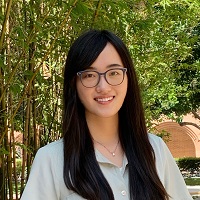Position: PhD Candidate
Current Institution: University of Southern California
Abstract: Large-Scale Multi-Agent Coordination
Recent advances in robotics have laid the foundation for building large-scale multi-agent systems such as for mobile robots drones autonomous cars and trains. One core challenge is to let a large team of agents navigate without collisions in congested environments while minimizing their travel times. Existing algorithms for solving this problem find either optimal solutions for only dozens of agents or suboptimal solutions for up to a few thousand agents but with unacceptably large travel times. I tackle this challenge by reasoning about the potential collisions among the agents and possible ways of resolving them in a systematic manner. Compared to the traditional method that reasons about the joint-state space of the agents reasoning about the collision-resolution space has two advantages. (1) (Cleverly) searching in the collision-resolution space often finds good solutions faster than searching in the joint-state space. For instance by reasoning about symmetries designing heuristics and deploying local search techniques in the collision-resolution space my algorithms can find optimal solutions by up to 4 orders of magnitude faster than before and improve the solution quality of suboptimal algorithms by up to 36 times. (2) The collision-resolution space does not require specific agent models and thus my algorithms can be applied to a broad class of real-world problems. For instance I have applied my algorithms to coordinate AGVs in the context of automated warehouses airport surface operation railway planning intersection control for autonomous vehicles multi-robot motion planning and multi-arm manipulation and successfully demonstrated their advantages over existing methods including reactive methods (that resolve collisions locally and greedily when they occur) optimization methods (such as mixed-integer linear programming) and machine-learning methods (such as multi-agent reinforcement learning).
Bio:
Jiaoyang Li is a final-year Ph.D. candidate in the Department of Computer Science at the University of Southern California (USC) advised by Prof. Sven Koenig. Her research is in the growing field of multi-agent systems especially the coordination of large teams of mobile robots. She exploits the combinatorial problem structure to develop principled algorithms for real-world applications such as autonomous warehousing traffic management and multi-robot assembly. She has published her research at prestigious AI conferences (AAAI IJCAI ICAPS and AAMAS) and journals (Artificial Intelligence Journal) and received press coverage for it. She has also received a Technology Commercialization Award from the USC Stevens Center for Innovation in 2018 an Outstanding Student Paper Award from ICAPS ’20 a Best System Demonstration Award from ICAPS ’21 and a Best Research Assistant Award from USC in 2021. She recently led a team that won the NeurIPS ’20 Flatland Challenge on railway planning.
